初中英语最全英语介词用法
初中英语介词用法总结与归纳
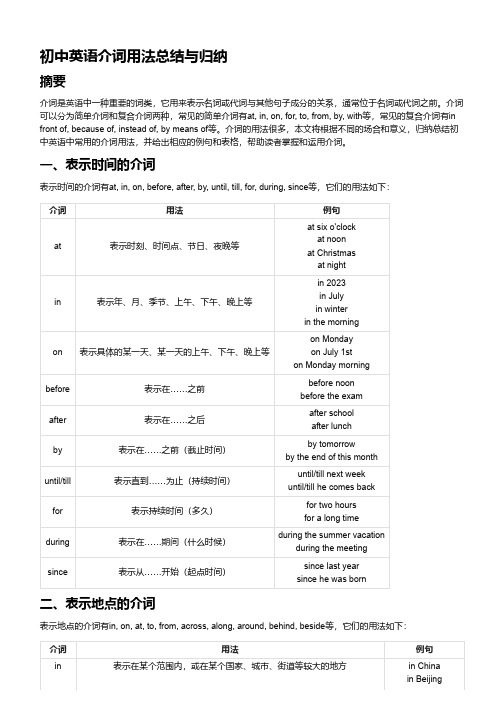
初中英语介词用法总结与归纳摘要介词是英语中一种重要的词类,它用来表示名词或代词与其他句子成分的关系,通常位于名词或代词之前。
介词可以分为简单介词和复合介词两种,常见的简单介词有at, in, on, for, to, from, by, with等,常见的复合介词有in front of, because of, instead of, by means of等。
介词的用法很多,本文将根据不同的场合和意义,归纳总结初中英语中常用的介词用法,并给出相应的例句和表格,帮助读者掌握和运用介词。
一、表示时间的介词表示时间的介词有at, in, on, before, after, by, until, till, for, during, since等,它们的用法如下:介词用法例句at表示时刻、时间点、节日、夜晚等at six o'clock at noonat Christmas at nightin表示年、月、季节、上午、下午、晚上等in 2023in Julyin winterin the morningon表示具体的某一天、某一天的上午、下午、晚上等on Mondayon July 1ston Monday morningbefore表示在……之前before noon before the examafter表示在……之后after school after lunchby表示在……之前(截止时间)by tomorrowby the end of this monthuntil/till表示直到……为止(持续时间)until/till next week until/till he comes backfor表示持续时间(多久)for two hours for a long timeduring表示在……期间(什么时候)during the summer vacation during the meetingsince表示从……开始(起点时间)since last year since he was born二、表示地点的介词表示地点的介词有in, on, at, to, from, across, along, around, behind, beside等,它们的用法如下:介词用法例句in表示在某个范围内,或在某个国家、城市、街道等较大的地方in Chinain Beijing介词用法例句in ZhongshanRoadon表示在某个表面上,或在某个楼层、台阶等较小的地方,或在某个方位上on the wall on the secondflooron the left/rightat 表示在某个具体的位置或地点,或在某个机构、场所等较小的地方,或表示靠近、附近等at the cornerat schoolat the bus stopto表示朝向某个方向或地点,或表示到达某个地点(范围之外)to the east to Japan to schoolfrom表示从某个地点出发或离开(范围之外)from home from Shanghai from Chinaacross表示横穿或穿过(从一边到另一边)across the street across the riveralong表示沿着或顺着(在一边)along the road along the riveraround表示围绕或环绕(在四周)around the lake around the worldbehind表示在……后面behind the door behind himbeside表示在……旁边beside the window beside her三、表示方向的介词表示方向的介词有to, from, into, out of, onto, off, up, down, through等,它们的用法如下:介词用法例句to表示朝向某个方向或地点,或表示目的地He is going to Beijing. She gave the book to me.from表示从某个方向或地点出发或离开,或表示来源He came from the south. This is a gift from my friend.into表示进入某个范围或空间(由外到内)He jumped into the water. She put the flowers into the vase.out of表示离开某个范围或空间(由内到外)He ran out of the room. She took the book out of the bag.onto表示移动到某个表面上(由低到高)He climbed onto the roof. She threw the ball onto the ground.off表示从某个表面上移开(由高到低)He fell off the bike. She took off her hat.up表示向上移动(由低到高)He went up the hill.介词用法例句She climbed up the ladder.down表示向下移动(由高到低)He came down the stairs. She slid down the slide.through表示穿过某个空间或物体(从一端到另一端)He walked through the forest. She looked through the window.四、表示方式、手段、工具的介词表示方式、手段、工具的介词有by, with, in, on等,它们的用法如下:介词用法例句by 表示交通工具、方式、方法等,或表示被动语态的动作执行者,或表示时间的截止点,或表示计量单位等by busby mistakeby himby tomorrowby weightwith 表示使用某种工具、器具、材料等,或表示伴随的人或物,或表示具有某种特征、状态等,或表示原因、理由等with a knifewith hisparentswith long hairwith joyin 表示使用某种语言、文字、颜色等,或表示穿着某种衣服,或表示处于某种状态、情况等,或表示在某种范围内等in Englishin black andwhitein a red dressin a hurryin generalon 表示使用某种电子设备、媒体等,或表示依靠某种力量、条件等,或表示以某种方式等,或表示参与某种活动等on TVon footon fireon dutyon holiday五、表示原因、目的、结果的介词表示原因、目的、结果的介词有for, at, from, of, with, by, because of, owing to, thanks to, out of, through等,它们的用法如下:介词用法例句for 表示原因、理由,常与sorry, famous, punish, praise, thank, blame等连用,也表示目的、意图,常与hope, wish, wait, look, come, go等连用,也可以表示用途、功能等for peacefor helpfor a walkfor funfor cutting paperat表示目的、意图,常与surprised, shocked, amazed, good, bad等连用,也可以表示针对、针对性等at his words at the news at math介词用法例句at solvingproblemsfrom 表示结果、效果,常与different, far, free, safe等连用,也可以表示来源、出发点等from the picturefrom now onfrom dangerfrom birthof 表示原因、理由,常与afraid, proud, sure, tired等连用,也可以表示所属、属性、特征等of the darkof himof the resultof his workwith 表示原因、理由,常与pleased, satisfied, angry, happy等连用,也可以表示伴随、方式、工具等with the answerwith himwith a smilewith a knifeby 表示方式、方法、手段等,也可以表示被动语态的动作执行者,或表示时间的截止点,或表示计量单位等by doing thisby himby tomorrowby weightbecauseof 表示原因、理由,相当于一个从句,后面接名词或代词等because of therainbecause of thatowing to表示原因、理由,相当于一个从句,后面接名词或代词等owing to the trafficjamowing to hisillnessthanks to表示原因、理由,含有感激或讽刺的意味,后面接名词或代词等thanks to yourhelp thanks to his carelessnessout of表示原因、理由,含有出于某种动机或感情的意味,后面接名词或代词等out of curiosity out of pitythrough表示原因、理由,含有经过某种过程或方式的意味,后面接名词或代词等through hard work through a window六、表示对象、范围的介词表示对象、范围的介词有of, for, about, with, to, from, among, between等,它们的用法如下:介词用法例句of表示所属、属性、特征等,也可以表示分离、脱离等the color of the skya cup of teaa friend of mineget rid of itfor表示目标、对象、受益者等,也可以表示目的、原因等 a gift for youa seat for twoa doctor for the poora room for rentabout表示主题、内容、话题等,也可以表示大约、左右等a book about history tell me about yourself about ten minuteswith表示伴随、陪同等,也可以表示方式、工具等stay with mea man with glasses speak with a loud voice cut it with a knifeto表示方向、目的地等,也可以表示对象、接受者等go to school fly to London say hello to him give it to herfrom表示来源、出发点等,也可以表示对象、对比者等come from Chinaa letter from my father different from youlearn from himamong表示在三个或三个以上的人或物之间(内部)share it among yourselves a flower among the grassbetween表示在两个人或物之间(内部或外部)sit between thema river between two mountains七、其他常用的介词除了上述介词外,还有一些其他常用的介词,如as, like, except, without, beyond, above, below, over, under等,它们的用法如下:介词用法例句as表示身份、职业、角色等,也可以表示方式、方法、程度等as a teacher as usual as you know as well aslike表示相似、类似等,也可以表示喜欢、喜爱等like a birdlike father, like sonI like music.except表示除……之外(不包括)everyone except me every day except Sundaywithout表示没有、缺少等without money without water without a wordbeyond表示超出、超过等beyond the wall beyond my expectation beyond controlabove表示在……之上(不接触)above the ground above sea levelabove allbelow表示在……之下(不接触)below the surface below zero below averageover表示在……之上(覆盖或接触)over the bridge over his head over the phoneunder表示在……之下(覆盖或接触)under the tree under his arm under the weather。
初中英语语法介词

初中英语语法介词介词在英文中是一种虚词,在英语里面的使用频率特殊高。
下面是学习啦我为你整理的初中英语的介词语法,希望大家宠爱!常用介词的用法1. 在的前面in front of (范围外的前面)in the front of (在范围内的前面)There is a river ________ my house.我家前面有一条河。
There is a blackboard ___ our classroom .教室前面有一块黑板。
2.在树上on the tree 强调树上长出的东西(苹果,橘子)in the tree 外来物体(人,鸟,风筝)There are some birds _____ the tree.树上有一些鸟。
There are some apples _______ the tree.树上有一些苹果。
3.时间表达:in + 某月/ 某季节/ 某年(时间长)on + 某天(中)at + 具体几点几分(短) 固定短语:in the morning / afternoon / evening at night, at noon练习:__January , __ summer, ___ 2021______ Sunday, ___ March 4th, ___ March___ _ Sunday morning,_____ the morning_______ the morning of June 5th_______ 6:30, ____ night, __ noon4.在墙上on the wall在墙壁外表(相片photo,图画picture)in the wall在墙壁的里面(门door, 窗户window )(1)There is a photo of my family_______ the wall.(2)There are two doors ______ the wall.5. 在之上on:在的外表之上(物体之间有接触)over: 在的正上方(物体没有接触)above 高于......;在......之上',多指在相对较高位置(1)There is a book ______ the desk.书桌上有一本书。
初中英语知识点归纳介词的用法
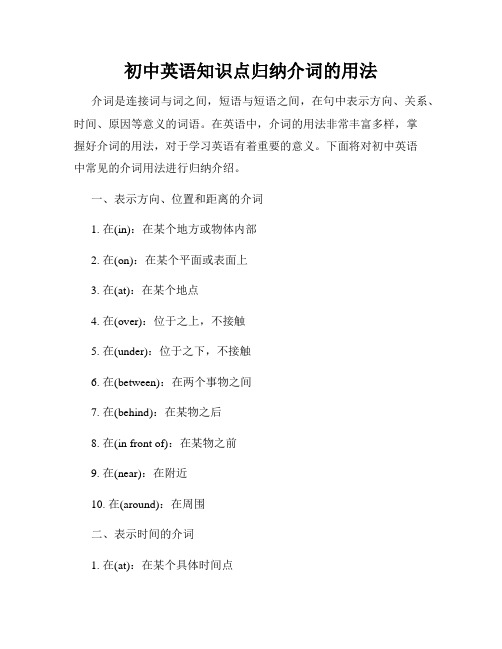
初中英语知识点归纳介词的用法介词是连接词与词之间,短语与短语之间,在句中表示方向、关系、时间、原因等意义的词语。
在英语中,介词的用法非常丰富多样,掌握好介词的用法,对于学习英语有着重要的意义。
下面将对初中英语中常见的介词用法进行归纳介绍。
一、表示方向、位置和距离的介词1. 在(in):在某个地方或物体内部2. 在(on):在某个平面或表面上3. 在(at):在某个地点4. 在(over):位于之上,不接触5. 在(under):位于之下,不接触6. 在(between):在两个事物之间7. 在(behind):在某物之后8. 在(in front of):在某物之前9. 在(near):在附近10. 在(around):在周围二、表示时间的介词1. 在(at):在某个具体时间点2. 在(in):在某个时间段3. 在(on):在某个具体日期三、表示原因的介词1. 因为(of):表示原因、缘故2. 由于(because of):表示原因、由于四、表示目的、用途和方式的介词1. 为了(in order to):表示目的2. 以便(in order that):表示目的3. 用(with):表示使用的手段或工具4. 通过(by):表示方式、方法5. 以(for):表示目的五、表示比较的介词1. 比较起见(than):表示比较的对象2. 和(with):与某人或某物在一起六、其它常见的介词1. 关于(about):表示涉及某一话题2. 靠(by):表示接近某人或某物3. 经过(through):表示通过某地或某事4. 编写(at):表示在某地工作或活动5. 因(as):表示角色、身份6. 例如(for example):表示举例7. 包括(including):表示包含某物以上是初中英语中常见的介词用法的归纳总结。
熟练掌握这些介词的用法,对于构建正确的句子和语法结构非常重要。
希望能对你的学习有所帮助。
初中英语介词短语归纳大全
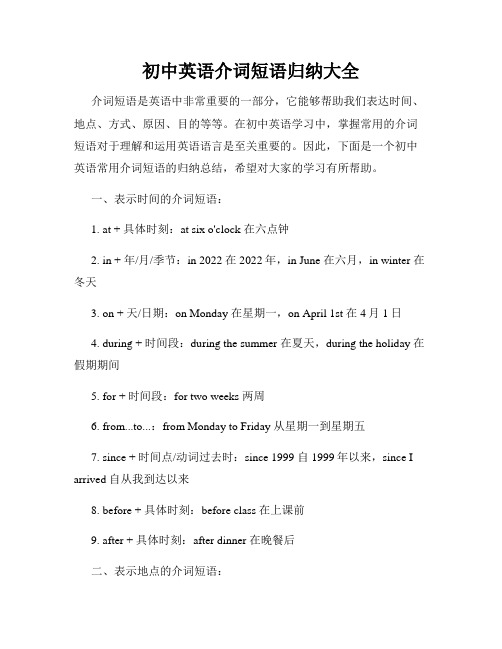
初中英语介词短语归纳大全介词短语是英语中非常重要的一部分,它能够帮助我们表达时间、地点、方式、原因、目的等等。
在初中英语学习中,掌握常用的介词短语对于理解和运用英语语言是至关重要的。
因此,下面是一个初中英语常用介词短语的归纳总结,希望对大家的学习有所帮助。
一、表示时间的介词短语:1. at + 具体时刻:at six o'clock 在六点钟2. in + 年/月/季节:in 2022 在2022年,in June 在六月,in winter 在冬天3. on + 天/日期:on Monday 在星期一,on April 1st 在4月1日4. during + 时间段:during the summer 在夏天,during the holiday 在假期期间5. for + 时间段:for two weeks 两周6. from...to...:from Monday to Friday 从星期一到星期五7. since + 时间点/动词过去时:since 1999 自1999年以来,since I arrived 自从我到达以来8. before + 具体时刻:before class 在上课前9. after + 具体时刻:after dinner 在晚餐后二、表示地点的介词短语:1. at + 具体地点:at school 在学校,at the park 在公园2. in + 大的地点范围:in the city 在城市,in the bedroom 在卧室3. on + 具体地点:on the table 在桌子上,on the wall 在墙上4. near + 具体地点:near the supermarket 在超市附近5. next to + 具体地点:next to the library 在图书馆旁边6. in front of + 具体地点:in front of the house 在房子前面7. behind + 具体地点:behind the tree 在树后面8. between + 具体地点:between the two buildings 在两栋建筑物之间9. among + 具体地点:among the flowers 在花丛中三、表示方式的介词短语:1. by + 交通工具:by bus 乘公交车,by bike 骑自行车2. on foot 步行3. with + 人/物:with friends 与朋友们一起,with a smile 带着微笑4. like + 方式:like this 这样,like a robot 像机器人一样四、表示原因的介词短语:1. because of + 名词/名词短语:because of the rain 因为下雨,because of the exam 因为考试2. due to + 名词/名词短语:due to the bad weather 因为坏天气,due to the traffic jam 因为交通堵塞3. thanks to + 名词/名词短语:thanks to my teacher's help 多亏了我的老师帮助4. as a result of + 名词/名词短语:as a result of the hard work 由于努力工作的结果五、表示目的的介词短语:1. for + 目的:for study 为了学习,for fun 为了娱乐2. in order to + 目的:in order to improve the skills 为了提高技能3. so as to + 目的:so as to help others 为了帮助别人以上就是初中英语介词短语的一些常见用法。
初中英语语法--介词(最新整理)

初中英语语法 --- 介词介词只能用在一个名词、代词或相当于名词的结构之前,也可以与后面的词一起构成介词短语。
介词通常位于名词或代词之前。
常见的介词用法:一.on五.其他常用介词练一练用适当的介词填空morning .2.Do the students stay home S a t u r d a y? 3.M y m o t h e r c u t t h e c a k ea knife4.We live a n e w h o u s e n o w.5.S h a n g h a i i sthe east of China.6.I usually have lunch noon.7.It’s eight o’clock.It’s time class.8.half past six , he usually has dinner.9.We have lessons eight o’clock twelve o’clock.11.There is a bridge the river.12.This is a photo my family.13.Tom comes England.14.My bed is the window.15.He looks his father.16.What's this English?17.The pen is the pencil-box.18.The bookstore is19.There are some pictures the right of our school.the wall.20.My telephone is the bed and the sofa.答案:1. at; in 2.at; on 3.with 4. in 5.in 6.at 7.for 8.At 9.from; to 10. with; by 11. over 12. of 13. from 14. near 15. like 16. in 17. in 18. on 19.on 20.between“”“”At the end, Xiao Bian gives you a passage. Minand once said, "people who learn to learn are very happy people.". In every wonderful life, learning is an eternal theme. As a professional clerical and teaching position, I understand the importance of continuous learning, "life is diligent, nothing can be gained", only continuous learning can achieve better self. Only by constantly learning and mastering the latest relevant knowledge, can employees from all walks of life keep up with the pace of enterprise development and innovate to meet the needs of the market. This document is also edited by my studio professionals, there may be errors in the document, if there are errors, please correct, thank you!。
(完整版)初中英语语法介词用法讲解与练习
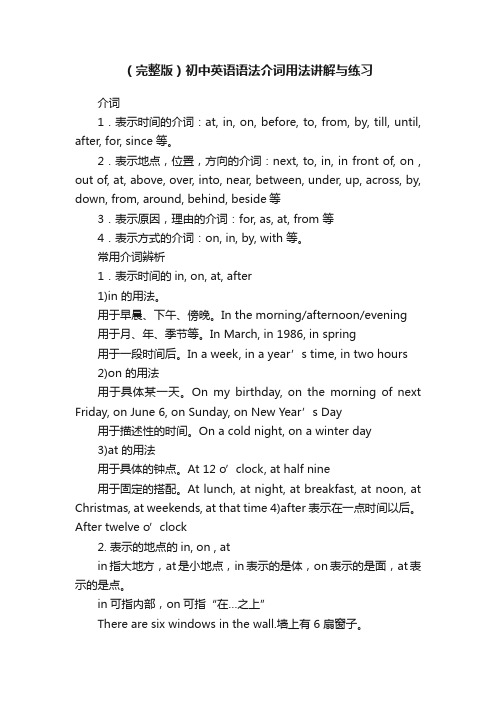
(完整版)初中英语语法介词用法讲解与练习介词1.表示时间的介词:at, in, on, before, to, from, by, till, until, after, for, since 等。
2.表示地点,位置,方向的介词:next, to, in, in front of, on , out of, at, above, over, into, near, between, under, up, across, by, down, from, around, behind, beside等3.表示原因,理由的介词:for, as, at, from 等4.表示方式的介词:on, in, by, with 等。
常用介词辨析1.表示时间的in, on, at, after1)in 的用法。
用于早晨、下午、傍晚。
In the morning/afternoon/evening用于月、年、季节等。
In March, in 1986, in spring用于一段时间后。
In a week, in a year’s time, in two hours2)on 的用法用于具体某一天。
On my birthday, on the morning of next Friday, on June 6, on Sunday, on New Year’s Day用于描述性的时间。
On a cold night, on a winter day3)at 的用法用于具体的钟点。
At 12 o’clock, at half nine用于固定的搭配。
At lunch, at night, at breakfast, at noon, at Christmas, at weekends, at that time 4)after 表示在一点时间以后。
After twelve o’clock2. 表示的地点的in, on , atin指大地方,at是小地点,in表示的是体,on表示的是面,at表示的是点。
初一英语常见介词用法归纳
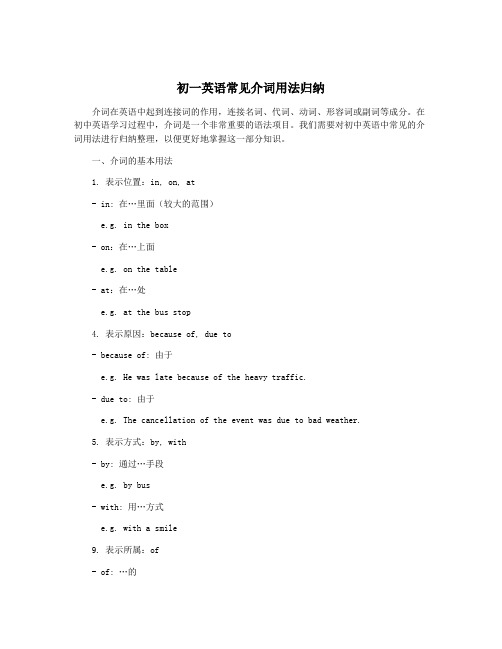
初一英语常见介词用法归纳介词在英语中起到连接词的作用,连接名词、代词、动词、形容词或副词等成分。
在初中英语学习过程中,介词是一个非常重要的语法项目。
我们需要对初中英语中常见的介词用法进行归纳整理,以便更好地掌握这一部分知识。
一、介词的基本用法1. 表示位置:in, on, at- in: 在…里面(较大的范围)e.g. in the box- on:在…上面e.g. on the table- at:在…处e.g. at the bus stop4. 表示原因:because of, due to- because of: 由于e.g. He was late because of the heavy traffic.- due to: 由于e.g. The cancellation of the event was due to bad weather.5. 表示方式:by, with- by: 通过…手段e.g. by bus- with: 用…方式e.g. with a smile9. 表示所属:of- of: …的e.g. the hat of the boy2. look forward to: 期待e.g. I am looking forward to the summer vacation.5. be interested in: 对…感兴趣e.g. Amy is interested in learning Chinese.三、常见介词错误用法及纠正1. 错误用法:depend of正确用法:depend one.g. We depend on each other.通过以上的介词错误用法及纠正,我们可以更清晰地了解该如何正确使用这些介词。
四、综合练习通过上述的综合练习,可以帮助大家更好地掌握介词用法。
英语介词用法详解(初中)

英语介词用法详解(初中)介词是一种虚词,不能独立充当句子成分,需与动词、形容词和名词搭配,才能在句子中充当成分。
介词是用于名词或代词之前,表示词与词之间关系的词类,介词常与动词、形容词和名词搭配表示不同意义。
介词短语中介词后接名词、代词或可以替代名词的词(如:动名词v-ing).介词后的代词永远为宾格形式。
一、表示时间的介词(一)表示时间段的介词(1)in , afterin +时间段,表示从现在起往后推算一段时间after +时间段,表示过去某时间往后推算一段时间,如:He’ll come back in two days. 但点钟用after( after three o’clock)He left on July 2 and returned after three days.(2)in , during表示在一段特指的时间内,可用in 或duringThe work was done in / during the holidays.表示年份、月份、季节用in , 如:in 1999 ,in June , in winter(3)in last, for the past + 时间段, during表示在最近一段时间内,句中谓语动词常用现在完成时I have been in Shanghai in the last few years.(4)for 表示延续一段时间。
I’ll study in the U.S for two yearsI’ve waited for Bingo for half an hour.(二)表示某一时间的介词(1)at, onat 表示某一时刻,on 表示某一天或日期, 如:at 7:14, on Saturday morning on the night of May2一天内各段时间表达, 选用正确的介词,请比较:in the morningon a winter / snow / cold / morningat nighton the night of March 7thin the eveningon Friday evening(2)before, bybefore 表示某一时间之前,而by 表示到某一时间止,句中谓语动词多用完成时态。
初中英语介词大全(带音标)
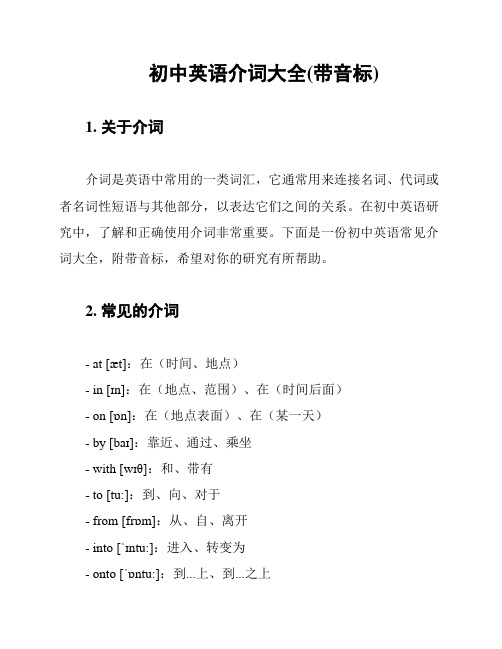
初中英语介词大全(带音标)1. 关于介词介词是英语中常用的一类词汇,它通常用来连接名词、代词或者名词性短语与其他部分,以表达它们之间的关系。
在初中英语研究中,了解和正确使用介词非常重要。
下面是一份初中英语常见介词大全,附带音标,希望对你的研究有所帮助。
2. 常见的介词- at [æt]:在(时间、地点)- in [ɪn]:在(地点、范围)、在(时间后面)- on [ɒn]:在(地点表面)、在(某一天)- by [baɪ]:靠近、通过、乘坐- with [wɪθ]:和、带有- to [tu:]:到、向、对于- from [frɒm]:从、自、离开- into [ˈɪntu:]:进入、转变为- onto [ˈɒntu:]:到...上、到...之上- out of [aʊt ʌv]:从...出来- for [fɔːr]:为、对于- about [əˈbaʊt]:关于、大约- with [wɪð]:用、带、跟- without [wɪˈðaʊt]:没有、无- of [ʌv]:的、属于- by [baɪ]:通过、靠- between [bɪˈtwiːn]:在...之间- among [əˈmʌŋ]:在...之中- near [nɪər]:靠近- beside [bɪˈsaɪd]:在旁边- under [ˈʌndər]:在...下面- over [ˈəʊvər]:在...上方- above [əˈbʌv]:在...之上- below [bɪˈləʊ]:在...之下- through [θruː]:穿过、通过3. 注意事项- 介词与其后的名词、代词有固定搭配,需要进行记忆。
- 不同介词有不同的使用场景和意义,需要根据具体语境进行选择。
以上是初中英语介词大全,带有音标,并附有简要说明。
在研究中,要多加练和熟练掌握这些介词的正确用法,以提升语言运用能力。
希望这份文档对你的研究有所帮助!参考资料:。
介词总结归纳初中

介词总结归纳初中介词是英语语法中的一个重要部分,用来表示名词、代词与其他词之间的关系。
在初中阶段,学生需要掌握并正确运用各种介词。
下面将对初中阶段常见的介词进行总结归纳。
一、表示位置或方向的介词:1. in:在某个范围、地点或建筑物内。
例:I am studying in the classroom.2. on:在某个平面或物体的表面。
例:The book is on the table.3. at:在某个特定的地点或事件上。
例:He is waiting at the bus stop.4. under:在某物的下面。
例:The cat is under the table.5. above:在某物的上面。
例:The bird is flying above the tree.6. behind:在某物的后面。
例:The car is parked behind the house.7. in front of:在某物的前面。
例:The children are playing in front of the school. 8. between:在两个物体或位置之间。
例:The river flows between the two mountains.9. among:在三个或三个以上的物体或位置之间。
例:He found his friends among the crowd.二、表示时间的介词:1. at:在特定的时间点。
例:The movie starts at 7 o'clock.2. on:在某一天、日期或节日。
例:We have a holiday on Sunday.3. in:在某个时间段或季节。
例:She was born in October.4. during:在某个时间段内。
例:I read a book during the summer vacation.5. for:表示持续时间。
初中英语介词用法总结

初中英语介词用法总结介词(preposition):也叫前置词。
在英语里,它的搭配能力最强。
但不能单独做句子成分需要和名词或代词(或相当于名词的其他词类、短语及从句)构成介词短语,才能在句中充当成分。
介词是一种虚词,不能独立充当句子成分,需与动词、形容词和名词搭配,才能在句子中充当成分。
介词是用于名词或代词之前,表示词与词之间关系的词类,介词常与动词、形容词和名词搭配表示不同意义。
介词短语中介词后接名词、代词或可以替代名词的词(如:动名词v-ing).介词后的代词永远为宾格形式。
介词的种类:(1)简单介词:about, across, after, against, among, around, at, before, behind, below, beside,but, by, down, during, for, from, in, of, on, over, near, round, since, to, under,up, with等等。
(2)分解介词:inside, into, outside, throughout, upon, without, within(3)短语介词:according to, along with, apart from, because of, in front of, in spite of, insteadof, owing to, up to, with reguard to(4)分词介词:considering, reguarding, including, concerning介词短语:构成介词+名词We go to school from Monday to Saturday.介词+代词Could you look for it instead of me?介词+动名词XXX.介词+毗连代/副词I was thinking of how we could get there.介词+不定式/从句XXX it.介词的用法:一、介词to的常见用法1.动词+toa)动词+ toadjust to适应,attend to处理;照料,agree to附和,amount to加起来达…,XXX属于,drink to为…干杯,get to到达,XXX发生在某人身上,hold to紧握,lead to通向,XXX听,occur to想起,object to否决,point to指向,XXX回覆,refer to参考;指的是…;触及,reply to回覆,XXX负责,stick to坚持,turn to求助,write to给或人写信。
初中英语知识点归纳介词的基本用法和固定搭配

初中英语知识点归纳介词的基本用法和固定搭配初中英语知识点归纳:介词的基本用法和固定搭配介词是英语语法中的重要部分,用来表示名词与其他单词之间的关系。
掌握介词的基本用法和固定搭配对于学生来说至关重要。
本文将归纳介词的基本用法和部分常见的固定搭配,以帮助读者更好地掌握初中英语。
一、介词的基本用法1. 表示地点关系:at, in, on介词at通常用于点、特定场所,如:at home(在家)、at the park (在公园);介词in通常用于大的、封闭的地方,如:in the classroom(在教室)、in London(在伦敦);介词on通常用于表面、线条以及交通工具上,如:on the table(在桌子上)、on the bus(在公交车上)。
2. 表示时间关系:at, in, on介词at通常用于具体时刻或某天的夜晚,如:at 8 o'clock(在八点钟)、at night(在晚上);介词in通常用于年、月、季节,如:in 2022(在2022年)、in April(在四月);介词on通常用于具体某一天,如:on Monday(在星期一)、on Christmas Day(在圣诞节)。
3. 表示原因和理由:for, because of介词for常与动词不定式搭配,表示目的或原因,如:apply for a job(申请工作);介词because of常与名词搭配,表示原因或引起的结果,如:because of the rain(因为下雨)。
4. 表示方式和手段:by, with介词by常与动词的进行时态搭配,表示方法或手段,如:go to work by bus(乘公交车去上班);介词with常与名词搭配,表示使用的工具或伴随状态,如:write with a pen(用钢笔写)。
5. 表示目的和结果:to, for介词to常与动词原形搭配,表示目的或移动方向,如:go to school (去学校);介词for常与名词搭配,表示目的或结果,如:a gift for you(给你的礼物)。
初中英语介词用法(详细)

初中英语介词的用法一、介词按其构成可分为:1. 简单介词at, in, on, to, since, until 等。
如:He's worked there since 1998.2. 复合介词into, onto, out of 等。
如:She is out of school. 她毕业了。
3. 二重介词from under, from behind, from out of, until after, except in 等。
如:I'm from out of town. 我是从城外来的。
4. 短语介词because of, instead of, in spite of 等。
如:I went back not because of the rain, but because I was tired.我回去不是因为下雨,而是因为我累了。
二、介词的作用:1. 表示地点:after, along, at, below, by, of, near, over, through, under 等。
如:Near the village the boys are skating on the ice. 男孩子们正在村子附近的冰上滑冰。
They lay down under the shade of a tree. 他们躺在一棵树的树阴下。
2. 表示时间:about, after, across, at, during, for, in, of, till, until 等。
如:After class he will tell us about the accident. 课后他将告诉我们有关事故的情况。
A heavy rain has been falling across three days. 一场大雨下了整整三天。
The accident happened during the night. 事故发生在夜间。
(完整版)初中英语介词用法全

初中阶段介词用法汇编※一、表示时间的介词:1、at、on、in“at时间点,有on必有天,in指月季年,也和色相连”就是说,有具体的时间点的时候用at,具体那一天用on,说到月份,季节,年份,就用in ;而且说谁穿了什么颜色的衣服的时候,也是用in XX(color)】at用于某一具体时刻或重大节日之前①在五点钟______②在中午________③在夜晚________④在圣诞节________⑤在午夜_________【答案】①at five o’clock ②at noon ③at night ④at Christmas ⑤at midnight(2)on用在具体某一天或某天的上午、下午、晚上之前①在国庆节_________②在周二晚上_________③在星期天_________【答案】①on National Day ②on Tuesday evening ③on Sunday(3)in用在周、日、季节或泛指的上午、下午、晚上前①在一周内_________②在五月_________③在夏季_________④在2009年_________⑤在下午_________ 【答案】①in a week ②in may ③in summer ④in 2009 ⑤in the afternoon归纳总结在初中阶段常见的固定短语in English用英语 in a minute一会儿、立刻 in a short while一会儿、不久in a hurry匆匆忙忙 in danger在危险中 in full全部地、详细地in a word一句话 in all总共 in every case不管怎样in the end最后 in spite of尽管 in person亲自in fact事实上 in good health身体健康的 in front of在……前面in some ways在某些方面 in common共同的 in public当众☆考题再现:---Who was the first man with A(h1n1) flu in mainland China know for sure?---________May 11,2009.A InB OnC ForD Since【答案】B 【解析】在具体的某一天用on2、before、afterbefore表示“在某时刻或某件事之前”,after用在时刻或某件事之后。
初中英语复习--介词用法归纳(共13张ppt)

A in B at C on D for
介词练习题 8 Let's hurry, or we'll be late ___ school
13 We must be strict ___ our selves ___ everything A with, in B in, with C with, to D to, of
14 Mr Black got to Hangzhou ___ a few days A in B my joy, I can answer this question A With B To C By D For
介词练习题 18 The teacher asked the students to look ___ the word in the
dictionary A for B at C up D after
四:固定搭配
by the way, at last, in the end
介词练习题 1 - Thank you ___ the beautiful flowers!- Not at all. A in B on C at D for
2 Can you answer this question ___ English? A by B in C with D from
19 A little monkey is playing ___ a tree and there are a lot of bananas ___ it A on, on B in, on C on, in D in, in
初中英语介词归纳

初中英语介词归纳介词在英语中起着非常重要的作用,它们表示名词、代词与其他词之间的关系。
对于初中生来说,掌握介词的用法是英语学习的重要一步。
本文将对初中英语中常见的介词进行归纳和解释,帮助学生更好地理解和运用介词。
一、表示位置的介词1.at:表示一个具体的点或位置。
例如:at home(在家),at school(在学校)。
2.in:表示在一个范围或区域之内。
例如:in the city(在城市里),in the classroom(在教室里)。
3.on:表示在某个物体的表面之上。
例如:on the table(在桌子上),on the wall(在墙上)。
二、表示时间的介词1.at:用于表示具体的时间点。
例如:at seven o’clock(在七点),at noon(在中午)。
2.on:用于表示具体的某一天或某一天的上午、下午、晚上。
例如:on Monday(在周一),on the morning of July 1st(在七月一日的上午)。
3.in:用于表示一段时间,如年、月、季节等。
例如:in 2023(在2023年),in spring(在春天)。
三、表示方式的介词1.by:表示通过某种方式或手段。
例如:by bus(乘公交车),by email(通过电子邮件)。
2.with:表示使用某种工具或伴随某种情况。
例如:write with a pen(用钢笔写),with pleasure(很高兴地)。
四、其他常用介词1.about:表示关于某个话题或大约的数量。
例如:talk about(谈论),about ten books(大约十本书)。
2.after:表示在某个时间或事件之后。
例如:after school(放学后),after dinner(晚饭后)。
3.before:表示在某个时间或事件之前。
例如:before breakfast(早餐前),before class(课前)。
4.under:表示在某个物体的下方。
- 1、下载文档前请自行甄别文档内容的完整性,平台不提供额外的编辑、内容补充、找答案等附加服务。
- 2、"仅部分预览"的文档,不可在线预览部分如存在完整性等问题,可反馈申请退款(可完整预览的文档不适用该条件!)。
- 3、如文档侵犯您的权益,请联系客服反馈,我们会尽快为您处理(人工客服工作时间:9:00-18:30)。
表示方位的介词:in, to, on
1. in 表示在某地范围之内。
如:Shanghai is/lies in the east of China.上海在中国的东部。
2. to 表示在某地范围之外。
如:Japan is/lies to the east of China.
日本位于中国的东面。
3. on 表示与某地相邻或接壤。
如:Mongolia is/lies on the north of China.蒙古国位于中国北边。
表示计量的介词:at, for, by
1. at表示“以……速度”“以……价格”
如:It flies at about 900 kilometers a hour.它以每小时900公里的速度飞行。
I sold my car at a high price.
我以高价出售了我的汽车。
2. for表示“用……交换,以……为代价”如:He sold his car for 500 dollars.
他以五百元把车卖了。
注意:at表示单价(price) ,for表示总钱数。
3. by表示“以……计”,后跟度量单位
如:They paid him by the month.
他们按月给他计酬。
Here eggs are sold by weight.
在这里鸡蛋是按重量卖的。
表示材料的介词:of, from, in
1. of成品仍可看出原料
如:This box is made of paper.
这个盒子是纸做的。
2. from成品已看不出原料
如:Wine is made from grapes.
葡萄酒是葡萄酿成的。
3. in 表示用某种材料或语言
如:Please fill in the form in pencil first.
请先用铅笔填写这个表格。
They talk in English.
他们用英语交谈。
注意:in指用材料,不用冠词;而with指用工具,要用冠词。
如:draw in pencil/draw with a pencil
表示工具或手段的介词:by, with, on
1、by用某种方式,多用于交通
如by bus乘公共汽车,by e-mail. 通过电子邮件。
注意:表示搭乘交通工具时,用by时不用冠词,用in时要用冠词。
如:I went there by bus/in a bus.
我是坐公共汽车去的那儿。
2. with表示“用某种工具”
如:He broke the window with a stone.
他用石头把玻璃砸坏了。
注意:with表示用某种工具时,必须用冠词或物主代词。
3. on表示“以……方式”,多用于固定词组
They talked on the telephone.
他们通过电话进行交谈。
She learns English on the radio/on TV.
她通过收音机/电视学英语。
表示关于的介词:of, about, on
1. of 仅是提到或谈到过某人或某事
如:He spoke of the film the other day.
他前几天提到了这部影片。
He thought about this matter yesterday.
他昨天考虑了这件事。
2. about 指“关于”某人或某事物的较详细的情况
如:Can you tell me something about yourself?
你能告诉我一些关于你自己的事情吗?
3. on指“关于”学术性的或严肃的事
如:It’s a textbook on the history of china.
它是一本有关中国历史的教科书。
表原因或理由的介词:for, at, from, of, with, by, because of
1. for表示原因,常与sorry, famous, punish, praise, thank, blame等词连用
如:I am sorry for what I said to you.
我后悔不该对你讲那些话。
2. at指情感变化的原因,意为“因听到或看到而……”
如:He was surprised at the news.
听到这消息他大吃一惊。
3. from指“外在的原因”,如受伤、车祸等
如:He died from the wound.
他因受伤而致死。
4. of指“内在的原因”,如病、饿等
如:The old man died of hunger.
老人死于饥饿。
5. with 指生理上或情感上的由外界到内心的原因
如:Hearing the news, he jumped with joy.
他们听到这个消息,欣喜若狂。
He was shaking with anger.
他气得浑身发抖。
6. by 表示外部的,尤其是暴力的或无意中造成某种结果的原因
Her body was bent by age.
他因年老背弯了。
She took your umbrella by mistake.
我因弄错拿了你的雨伞。
7. because of 表示引起结果的直接原因
如:He retired last month because of illness/because he ill.
8. owing to 多表示引起某不良后果的原因
如:Owing to the rain they could not come.
由于下雨他们没来。
9. thanks to 表示引起某种幸运结果的原因,常译为“幸亏……,多亏……”如:Thanks to John, we won the game.
多亏约翰,我们才赢了这场比赛。
10. out of 表示动机的起因,常译为“出于……”
如:He asked the question out of curiosity.
他出于好奇才问了那个问题。
11. through多表示因局部而影响全局的原因
如:The war was lost through bad organization.
战争因组织不周而失败了。
表示好像或当作的介词:like, as
1. like表示“像……一样”,其实不是
如:Peter the Great, like his country, was strong and proud.
彼得大帝像他的国家一样强健和自豪。
2. as表示“作为,以……身份”,其实也是
如:He talked to me as a father.
他以父亲的身份跟我谈话。
注:as作连词时,可表示“好像……”。
如:The work is not so difficult as you imagin.
这工作不像你想像的那么困难。
表示支持或反对的介词:against, for against反对,for支持,互为反义词。
如:Are you for my idea or against it?
你赞同还是反对我的想法?
表示除某人某物外的介词:besides, except
1. besides是包括后面所提人或物在内的“除……外,还”
如:Thirty students went to the cinema besides him.
除他以外,还有30个学生去看了电影。
(他和另外30人都去了)
He is interested in tennis besides(=as well as)football.
除了足球,他还对网球感兴趣。
2. except是指不包括后面所提人或物在内的“除去”
如:Everyone is excited except me.
除我以外的每个人都很激动。
(他们激动,而我却不激动)
All the visitors are Japanese except him.
除他以外的所有游客都是日本人。
(其他人是日本人,可他不是)
注意:(A) except通常与表示全体的all, every连用;若与other连用,只能用besides。
如:He had other people to take care of besides me. 除我之外他还要照顾别人。
(B) except是排除同类;而except for是排除非同类,常在说明基本情况后,从细节上加上修正。
如:The composition is very good except for a few spelling mistakes.除了几处拼写错误之外,这篇作文整体还是不错的。
(作文与拼写错误是非同类的)
但except for也可代替except,特别是在句首时,因为except是不能用于句首的。
如:Except for George, you can all go.
除乔治外,你们都可以去。
